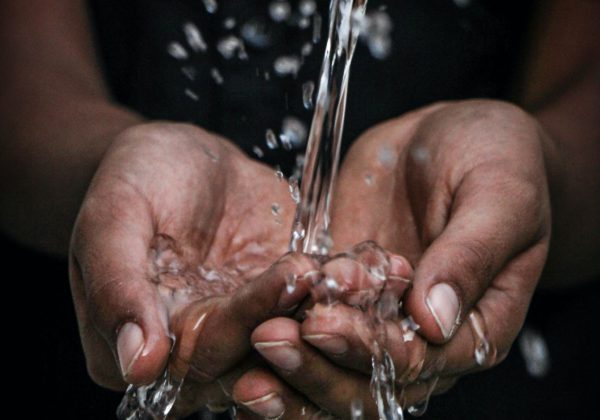
God’s thirst…and ours!
This week we welcome Rev. Dr Ian Poole, Rector of the Parish of Bushbury and part of the Love Black Country Core Team, as he explores how Jesus’ encounter with the Samaritan woman in John 4 can speak to us during the Coronavirus pandemic.
In the last few weeks if not months our nation and the world has found itself in an unprecedented situation and surely it is not an exaggeration to describe it as a crisis. The direct effects of Covid 19 and the accompanying fear and economic slow down are devastating to life as we know it. Yet in all of this mayhem there have been so many signs of goodwill and neighbourly love and care…. A clear sign that in our humanity there is still dwelling the image of God. In some nations there has even been a bold acknowledgement by national leaders of the Lord being sovereign over all and of Him being available to us in our need. Yet much more is required of us and I believe the passage of scripture in John 4: 1-26 and the description of this incredible encounter between Jesus and the Samaritan woman has something to say to us in our present circumstances.
Let us first consider where, when and with whom this encounter takes place. Jesus was returning to Galilee and the quickest route was necessarily through Samaria yet for many Jews this was a God forsaken land and a people best avoided. It was midday, which is the hottest part of the day in that region and the person Jesus meets is a woman on her own, both of these facts are unusual, since the normal time for her to collect water would be earlier in the day and in the company of other women. Was she somewhat of an outcast and as well as being there to draw water, was she hoping for some immoral trade, or both?!
We know that nothing in Jesus’ life just happened, there was always purpose and so we can presume that Jesus was not ambushed by embarrassment in these circumstances. He intended to walk through this God forsaken land and He wasn’t going to ignore this woman even though any other self respecting Jew would have run a mile rather than be seen talking to a Samaritan, let alone a Samaritan woman and let alone one whom some might think, with good reason, had somewhat loose morals.
Now, how was Jesus in Himself? He was unaccompanied and after many miles travelling on foot he was both tired and thirsty. We might say that Jesus, He who was also fully divine, possessed in this situation a degree of human vulnerability, even frailty. He is true to how he must have been feeling by asking this Samaritan woman for a drink. ‘Will you give me a drink’ (V7).
Let us pause for a moment and ask ourselves how might Jesus be walking amongst us in our day and nation(s). Do you think He might want to give us the slip and wait until we sort ourselves out and emerge from our present crisis? Is it possible that He might subject himself to the wearisomeness of our sin filled world and in the heat of this day and season ask, if you like, of our humanity, for a drink of cool and life giving water? Do you hear him say I want some refreshment, some worship, adoration, prayer and connection with you guys! So what have we to give? We who recently haven’t been able to find the most basic of commodities in our shops! So what can we give Jesus? Maybe our materialism and sophistication is just not going to cut it with Him! How about the Samaritan woman and this passage of scripture …. Can they help us? This leads us on to another question. How does the Samaritan woman react to Jesus and what might we learn from this?
First, the ridiculousness of the situation is not lost on her. (V9). Look, Jesus, you are a Jew and I’m not only a Samaritan, but a Samaritan woman. You and me are like a prince and a pauper.
Second when Jesus explains He has some ‘living water’ she checks out the facts and explains that you can’t be getting it from anywhere near here as you haven’t got the right means (V11) as you don’t realise how deep the well is and she might have thought neither do you know how deep my need is.
Third, she clearly takes seriously the offer of Jesus’ eternally thirst quenching water and notes that it creates its own spring within whoever takes it in and that this spring wells ‘up to eternal life’ (V14 – 15). She acknowledges her thirst.
Fourth, rather than grow angry at Jesus’ accurate summary of her chaotic family and social life she honours him as a prophet. (V19).
The conversation goes on and after discussing what true worship looks like, she fully realises that she has met the Christ and the answer to all her own deep thirst for forgiveness and purpose and she clearly drank deeply of the everlasting waters Jesus had offered her, because so many other Samaritans in that town believed through her testimony. ‘He told me everything I’ve ever done’ (V39).
In summary this Samaritan woman is inquisitive and may be bold too, but she is humble and finds the ancient symbolic power and promise of Jacob’s well through the person of Jesus. Surely as Jesus’ acknowledges His own natural thirst He identifies with the thirst of humanity in every area of our lives and this abundance of eternal living water is on offer to us and the Samaritan woman, because Jesus knew He would take on the depth and horror of our thirst on the cross. ‘I am thirsty’. (John 19: 28). He of course was literally thirsty, being no doubt severely dehydrated, but He was also experiencing our thirst for the everlasting waters as all the horror of our world filled His being.
So for ourselves…. Do we live in a God forsaken land? Surely we must admit that we to a large extent have forsaken Him! We are like that Samaritan woman, unclean and dispossessed of the inheritance of Israel and yet we see in her humble honesty with regard to the need and thirst of her own life a way for her great need to be assuaged as she tasted of the ‘spring of water welling up to eternal life’. Jesus comes to us and asks us can we give Him a drink of living waters? That is, can we give Him our humble attention, adoration and worship?
The answer is as a society and even in part as the Church, largely, NO! However, when Jesus met the Samaritan woman and offered her the living water, He did so at Jacob’s well; a place of ancient worship and prayer where both Abraham and Jacob had built an altar. In our present crisis our need is being exposed, even our thirst and we have nothing for ourselves let alone Jesus, but just as Jacob’s well was there in Samaria so there are ancient wells of worship in our own land, for example the Great Awakening of Wesley and Whitefield in the 18th century, the Welsh revival in 1904, the Pentecostal revival of 1906 and the charismatic renewal from 1960s to 80s. These wells have been filled in by the enemy of our souls, but as we seek the Lord they can be uncovered. Uncovered by prayer, faith and longing, so that once more the eternal living waters can flow as we apprehend Jesus standing in our midst. Surely then our land will be not only healed of Covid, but also of our separation from our loving heavenly Father. (2 Chronicles 7: 14).
Related posts
 Spotlight – Oneness on the rise over Easter - Together in Action: Churches Together Transforming Communities Churches working together in the heart of the Black Country are helping inspire and revitalise their communities with groundbreaking acts of oneness. From different expressions of worship, yet with hearts for togetherness, Christians in the boroughs of Dudley and Walsall have demonstrated just what can be achieved for […]
Spotlight – Oneness on the rise over Easter - Together in Action: Churches Together Transforming Communities Churches working together in the heart of the Black Country are helping inspire and revitalise their communities with groundbreaking acts of oneness. From different expressions of worship, yet with hearts for togetherness, Christians in the boroughs of Dudley and Walsall have demonstrated just what can be achieved for […] A magnificent moment! - Together Festival 23 took place on Saturday 8th July. You can read our account of the day here.
A magnificent moment! - Together Festival 23 took place on Saturday 8th July. You can read our account of the day here. Churches work together to tackle youth unemployment - In order to tackle the growing unemployment statistics amongst 16-24 year-olds, central government has invested £2 billion in an initiative called “Kickstart” and churches across the Diocese of Lichfield are taking full advantage of it.
Churches work together to tackle youth unemployment - In order to tackle the growing unemployment statistics amongst 16-24 year-olds, central government has invested £2 billion in an initiative called “Kickstart” and churches across the Diocese of Lichfield are taking full advantage of it. Together Apart 4 – A Year in Lockdown - We're happy to announce that we will be hosting our 4th regional Together Apart gathering on Sunday 9th May at 6pm, live on Facebook and Zoom.
Together Apart 4 – A Year in Lockdown - We're happy to announce that we will be hosting our 4th regional Together Apart gathering on Sunday 9th May at 6pm, live on Facebook and Zoom. Increasing need for education chaplaincy as schools return - As they return to school on 8th March after months out of formal education, thousands of children and young people across the Black Country will require far greater support than simply what school teachers are able to offer. Local churches can provide essential pastoral support for schools through chaplaincy partnerships and this has never been more essential than it is now.
Increasing need for education chaplaincy as schools return - As they return to school on 8th March after months out of formal education, thousands of children and young people across the Black Country will require far greater support than simply what school teachers are able to offer. Local churches can provide essential pastoral support for schools through chaplaincy partnerships and this has never been more essential than it is now.